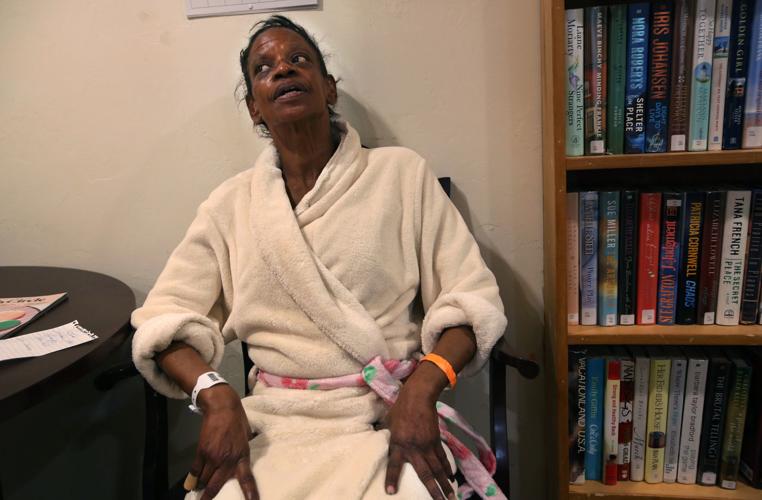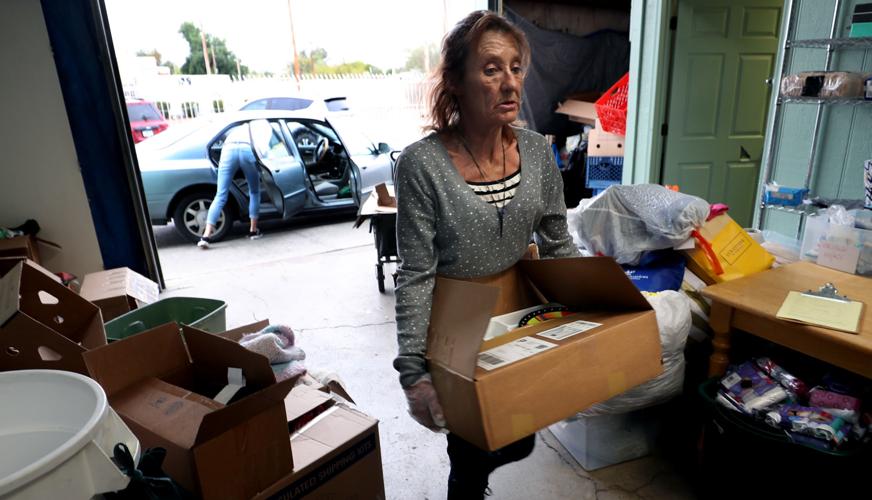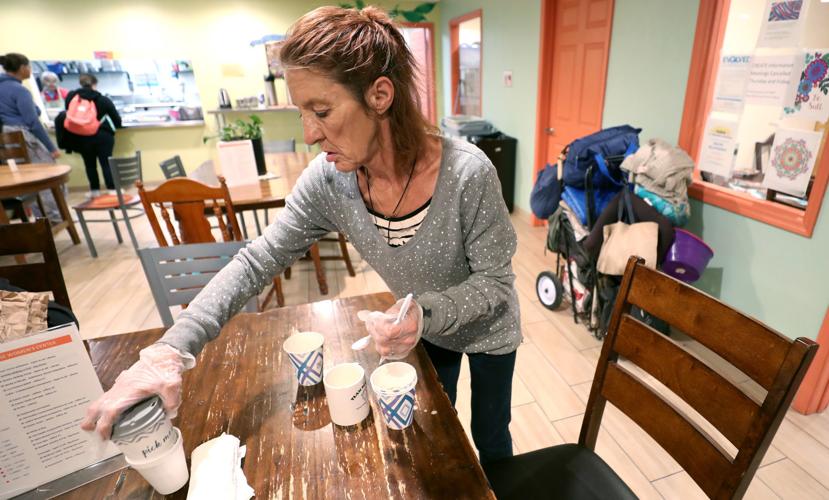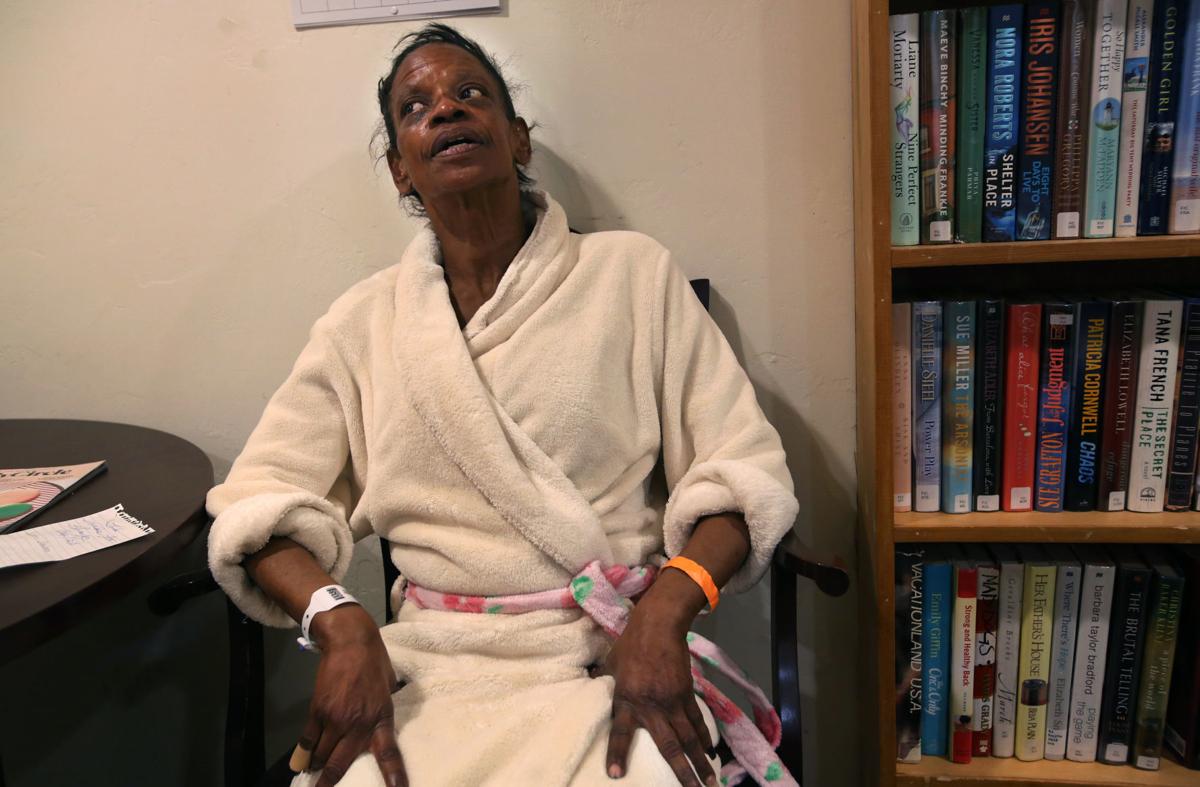It was about 42 degrees and dark when Julianna Johnson was dropped off in front of a locked gate along South Park Avenue.
She yelled repeatedly for someone to let her in, but the front door of the Sister Jose Women’s Center was far enough away to mute her voice. The volunteers, there for the center’s overnight shift, weren’t expecting her and didn’t hear her until after 5:30 a.m. Friday.
Johnson, who is 55 and coping with colon cancer and diabetes, had been taken from the shelter to Banner-University Medical Center by ambulance Thursday afternoon, consumed with pain.
At the hospital, she said she was given medication for what the discharge papers listed as “unknown abdominal pain,” an odd assessment since Johnson and Sister Jose staff members said she’d received cancer treatment at UMC just a week or so earlier.
Johnson said she was ushered from the hospital to a hired ride just before 4 a.m., wearing pajamas, a thin blanket and no shoes.
It’s not the first time she’s been released to the streets while dealing with cancer, which she’s had since 2010, but never in the middle of the night.
“I came close to not going because I didn’t want what happened to me last night to ever happen to me again,” she said. “I was out there a long time before somebody came.”
On average, the center sees about two women per month who have just been discharged from local hospitals, said Penny Buckley, Sister Jose’s program director. The women need respite and sometimes continuing care, she said, but they end up at the busy shelter because there’s nowhere for them to go.
“We’ve had to call back to the hospital and ask, ‘Why was this person dropped off here?’” she said.
UMC spokeswoman Rebecca Ruiz McGill said UMC is “committed to providing quality, compassionate care and services to all of our patients, regardless of their economic circumstances” but that no one could comment on Johnson’s experience due to patient confidentiality.
However, Sister Jose’s executive director, Jean Fedigan, said UMC officials reached out to her Friday afternoon about creating a community partnership to find a solution to what Fedigan calls “the gap” in care.
“We do need to do better than we do,” she said, acknowledging that she knows hospitals are often overwhelmed with patients and do not have enough bed space. “I absolutely believe we have a gap in our continuum of care.”

Deanna Gillingham once needed the help of the Sister Jose Women’s Center. Now she works there as a housekeeper.
“What else do we do?”
Helping homeless women who are dealing with cancer and other illnesses started about five years ago for Fedigan, who remembers vividly the bright red streaks on Deanna Gillingham’s chest.
Gillingham had undergone a mastectomy for breast cancer before being released back to the streets. She came to the shelter because she knew Fedigan, who has a nursing background, could help her with the infection that was spreading from the tubes in her chest.
“She came to me and they were bright red,” said Fedigan, referring to the sites where drainage and pain medication tubes had been inserted. “She didn’t know what to do with the bags and the drains.”
Gillingham went back to the hospital to get treatment for her infection, a common outcome for women too medically fragile for the shelter.
“What else do we do?” said Fedigan. “Put them on the street?”
Center being planned
The American Hospital Association reports many hospitals nationwide have started trying to improve health care for homeless people by working toward community housing solutions.
One local example involves a partnership between Tucson Medical Center and CODAC Health, Recovery and Wellness, along with the Connie Hillman Family Foundation, in opening a transitional housing program for mothers struggling with addiction.
The Connie Hillman Family Foundation House, which opened in 2018, offers a safe place for pregnant, postpartum and parenting women and their children.

Sister Jose housekeeper Deanna Gillingham came to the shelter following a mastectomy. She had to return to the hospital to get treatment for an infection.
TMC works closely with other partners in the community to try to ensure ongoing patient care, said Julia Strange, vice president of community benefit for the hospital, but there are challenges when people have nowhere to go.
“The hospital is the highest level of care and not the place for long-term housing for people who do not have sustainable housing,” she said.
Interview requests for Carondelet St. Mary’s and Carondelet St. Joseph’s hospitals were declined, but spokesman Keith Jones said both “work collaboratively with patients and community partners to ensure safe discharge plans are in place, and efforts are made to connect all patients with available resources when needed.”
Strange and Fedigan said they hope the challenge will be eased with the opening of a new medical respite center, a collaboration of Catholic Community Services and El Rio Health and other community partners that was announced in October.
The center is being planned for El Rio’s Cherrybell Campus, 1230 S. Cherrybell Stravenue, and, once constructed, will include 48 beds, with a separate section for women. End-of-life care will also be available.
It’s an exciting plan, Fedigan said, but right now she finds the magnitude of the problem overwhelming.
“Very grateful”
Sister Jose Women’s Shelter provides daytime and overnight shelter year-round for hundreds of women who are homeless and challenged by a variety of issues, including childhood trauma, domestic violence, mental health challenges, addiction and unemployment.
Many of the women are able to participate in on-site programming that helps them go on to housing and employment, while others continue to cycle through hospitals and behavioral health centers.
The number of women seeking help increased more than 20% between 2018 and 2019, said Buckley, the center’s program director. In July 2018, 1,898 women came through the shelter while in July 2019 that number had jumped to 2,319. In August, it was 2,403.
The shelter, at 1050 S. Park Ave., can house up to 35 overnight but during the day as many as 125 women might pass through. Anywhere from five to 20 women are turned away each night.
Gillingham, who now works as a housekeeper at Sister Jose’s, remembers her cancer surgery and the aftermath as a difficult time. She said she was still feeling the effects of the medication from her surgery when she was released to the streets by way of a cab.
There was no bed for her to rest, since the shelter back then only offered beds during colder months, but fortunately Fedigan got Gillingham back to the hospital for follow-up care.
For Johnson, being at the center and around the staff she has come to know is very comforting.
She was resting on her cot under a pile of blankets Friday morning when Fedigan came in to check on her and find out what happened during the night.
“I’m just elated that I have somewhere to go,” said Johnson. “I’m very grateful.”







